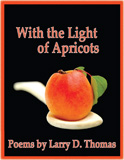October 30, 2009WITH THE LIGHT OF APRICOTS by Larry D. Thomas
 Review by Jeffrey C. Alfier
Review by Jeffrey C. Alfier
WITH THE LIGHT OF APRICOTS
by Larry D. Thomas
Lily Press
2007, 20 pp.
Free download
http://larrydthomas.com/Apricot.pdf
(1.7 MB pdf)
There is a quietly relentless power running through the lyrics of With the Light of Apricots, Larry D. Thomas’s sixth book of poems, and his first published by an online publisher, Lily Press. Thomas has won many awards for his poetry, including two Texas Review Poetry Prizes, and is the recipient of two Pushcart prize nominations. With the Light of Apricots is unquestionably worthy of these honors, a work that celebrates life’s hard truths and riddles through a determined eloquence.
Thomas’s impeccable imagery is often illuminated through a single word. In “Remember,” the word “teeth” introduces the temporality of fortune into an unfolding scene of idyllic retrospection, one beyond “when the sun / was a slice / of a tangerine.” Are teeth part of a smile or a sneer after the long years of “honeycombs” and “mimosas”? The reader knows that more is vouchsafed the speaker than he or she is aware of. Thus we see this trajectory continue in “Fried Pies” where the fate-laden term “maw” serves the same reflective portent that “teeth” does in “Remember,” hovering as it does just below the surface of childhood dreams.
In “Apricots” we discover beyond “the Santa Fe evening light” the same fleeting radiance presented to the young suitor in Joyce’s “Araby.” Thomas’s young mates who “…lumbered down / the darkening street…” evoke Joyce’s young protagonist “Gazing up into the darkness” to see “as a creature driven and derided by vanity” (James Joyce, The Dubliners). Such is the realm of youthful inexperience, and in “Five Houses Down” the panic of a day-care worker belies the innocent perceptions of toddlers who have wandered off. In their naïveté, the ripe apricots the toddlers found were nothing but fortuitous beneficence, oblivious as they were to the frantic day-care worker fearing for their safe return.
“Interlude Late in an Afternoon” is simply outstanding as it bears the subtle strength of quiet eroticism. Inscribing erotic themes, even subtly, is no easy task, as it runs the risk of sounding like pornographic cliché on one hand, and silly on the other. Thomas elides these pitfalls. Here, the speaker is approached by a young woman “pressing firmly into my hand / the wetness of two apricots, / overripe…” But are the speaker’s romantic opportunities yet lost? The reader is left to ponder, and this is what is so dignified about Thomas’s verse: there are no easy answers, and any potential resolution is pleasantly ciphered.
In “At the One of Solid Silk,” a suddenly-widowed young husband’s memories of his wife are achingly fast-forwarded to the stark precipice of his wife’s passing. In the next-to-last verse she is “cropped” out of time, a memento mori he painfully realizes her silk blouse has become. The depth of such solicitude finds a kindred redolence in “The Picker” and its enchanting bit of mystery in the salience of the apricot’s sheer scent. The reader is suddenly aware that the apricots might outlast the woman’s husband, as well as her infant. Indeed, “The Dream” shows us that apricots cannot be sequestered to solipsist human desire without becoming intensely redolent in the painfully repentant mind. In the same vein, the very elderly man in “The Apricot Tree” finds that near the end of his life the tree pictures the early promises of his youth, when life was “fecund / with the promise of baskets and damsels.” In this poem, it is hard not to think of Frost’s “After Apple Picking.”
One sees intensely the shadows in “Still Life” that make apricots integral to that form of art. The lines, “…The knife / and fork, lying equidistant…” introduce an implicitly ordered demise. Though serving the human need to enjoy apricots, it is hard not to think of those utensils as semiotics beyond their immediate purpose, like the farm implements of Housman’s psychic and shadowy A Shropshire Lad.
What many of Thomas’s poems reiterate is that although there are few convenient truths in aging, what endures near the end of days may hopefully be blessed essentials. In “The Centenarians” we find apricots integral to the sustenance of the elderly portrayed there. We find a moving deliquescence in the lines, “their weightless, / rawboned frames, / allowing them / ghostlike movement, / the inconspicuousness / of a mind / whooshing / through the rooms / of memory.” Who, reading these verses, would not think of their own beloved kin? Such is the transitory nature of life amid the persistence of human love seen so powerfully in “Artificial Fruit,” the last poem in the volume. Here we are reminded again that though the beauty of the false may be intense, better yet is the transitory glory of the genuine. In making this the last poem of the volume, it is as if Thomas offers us fair counsel that in “…symmetry, too perfect…” lies a disingenuous light.
All of Larry Thomas’s works exhibit, with clarity and immediacy, poems that witness powerfully to the world around us. In With the Light of Apricots, a common fruit– overripe, vividly-colored, or pungently sweet—proves a semaphore for that which weighs most on the human heart; a heart that, however subdued, maladapted, or even denied, might finally persevere.